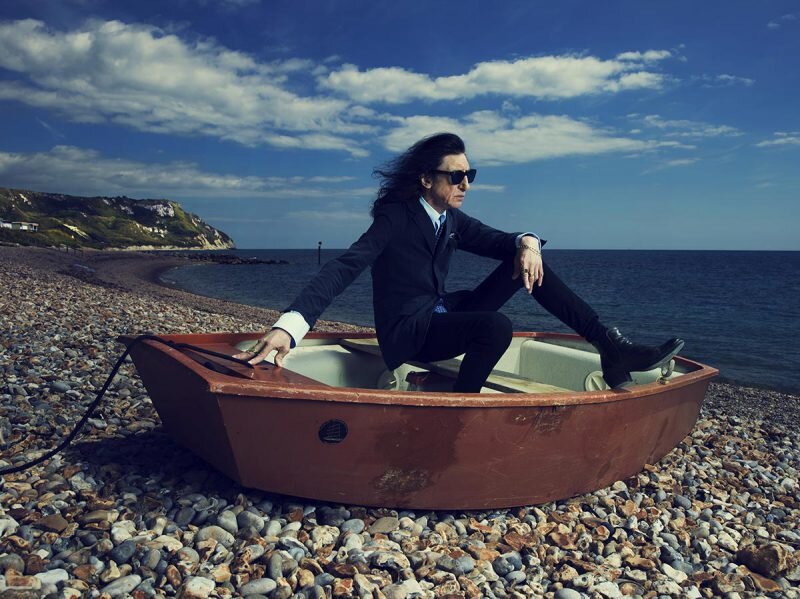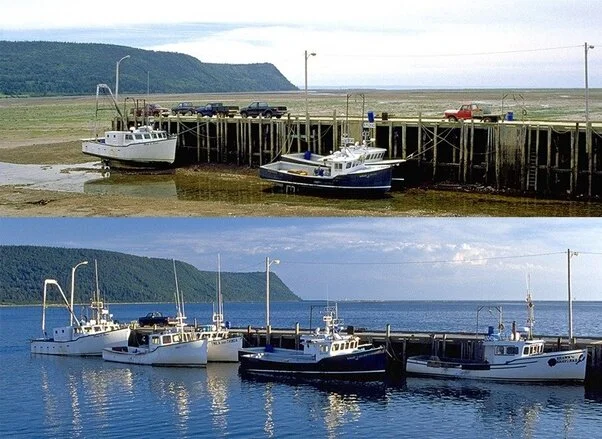By The Landlord
“There is a tide in the affairs of men
Which, taken at the flood, leads on to fortune;
Omitted, all the voyage of their life
Is bound in shallows and in miseries.
On such a full sea are we now afloat;
And we must take the current when it serves,
Or lose our ventures.” – William Shakespeare , Julius Caesar
“Time and tide will wait for no man, saith the adage. But all men have to wait for time and tide. That tide which , taken at the flood, would lead Seth Pecksniff on to fortune, was marked down in the table, and about to flow.” – Charles Dickens, The Life and Adventures of Martin Chuzzlewit
“I'm sittin' on the dock of the bay
Watchin' the tide roll away.” – Otis Redding
“Let's swim to the moon
Let's climb through the tide
Surrender to the waiting worlds
That lap against our side.” – Jim Morrison
“In high tide or in low tide,
I'll be by your side.” – Bob Marley
“The tide rises, the tide falls,
The twilight darkens, the curlew calls;
The little waves, with their soft, white hands,
Efface the footprints in the sands,
And the tide rises, the tide falls.” – Henry Wadsworth Longfellow
“The town was so dull: one day the tide went out, and it never came back.” – Tommy Cooper (just like that …)
It brings then it steals, it breathes in and out, it hides and reveals, from dark until light. High ebb to low, fast then slow, it arrives, lingers, rinses, gobbles, sucks, gurgles, farts, then gradually, leaving stringy, sticky, seaweedy fingers, departs. Gentle or forceful, the tide is one of nature's remorselessly benign miracles, strangely hidden in plain sight, going at its own, just perceptible pace, a twice-daily delivery of the world in rhythm, a metaphor for the cycles of life, from crashing shore and chattering shingle to drawn-out estuary of squashy, salty, twitchy, cockel-and-mussel splat of mudflat sticky.
And what more profound idea then, that it being the tide that brought our distant ancestors onto the shores of mammalian aspiration, those first brave fish, flapping and gasping to become land amphibian, gradually losing fins to develop feet and limbs. How did that work out?
No wonder then that the tide is an endlessly fascinating subject for poetry and other literature, art, and of course song. But for most of us who don't live by the sea, it's not something of which we are at least visually aware, and yet it's an expression of something within us, our bodies being 70% water, so we must also subconsciously experience our own personal high or low tides of life, gravitational pull by the movement of moon, sun and spinning Earth. And when all three line up line up at the time of new moon the effects are more extreme, the high tides higher and the lows lower. So I sometimes think I should carry my own tidal timetable to predict the ebb and flow of mood, energy and sleep.
Gravitational pull of the tides
So then, in Earth’s dirurnal or semi-dirurnal course, what are the parameters of this topic? Essentially it’s all about the water moving in and out, and what that is all about. Coasts, sea and sand are subjects that have washed up on our shores before, but while tide can overlap with these, there is also a vast area of musical land and water to discover and share. For it’s not merely literal, or indeed coastal littoral, but also swimming much in the metaphorical. There are many idioms that float around to express the rhythms of life, from turning the tide, to high tide, time and tide, or attempts to stem the tide. Aphorisms, allegories and proverbs, famous poetic lines and stories have been plundered aplenty in song lyrics, not to mention those placed in the very setting of tide itself, swimming in, fishing in, or simply watching it come in or out.
Tide is a an eternal marker of time. The time and time idiom has been around for centuries, probably in many cultures for thousands of years. It was first referenced in Old English in the writing of St. Marher in 1225 who scribbled with quill:
“And te tide and te time þat tu iboren were, schal beon iblescet.”
And after that a tide of similar metaphors broke literary shores from 14th-century Chaucer to John 15th-century John Skelton, 16th-century Shakespeare and Thomas Nashe all the away to 19th-century Walter Scott and Charles Dickens.
It’s those places that transform between land and water twice daily that I find most fascinating - the intertidal of marine life overlap where land and ocean meet in a constant wet handshake, not merely on the actual sea coast, but also on estuaries of many types and topographies, the mudflats, sandbanks and shoals if exposed or shallow on the low tide, mangrove and saltmarsh and all their vegetation, geography and lifeforms, but not simply beaches, bomboras or reefs unless of course, the tide is specifically mentioned and there may be many songs rising up there.
Natural highs and lows
One of my favourite places to visit is the long, wide estuary that comes in from Teignmouth and opposite it Shaldon on the south Devon coast south-west of Exmouth. I’ve been lucky enough to be able to stay at a friend’s holiday cottage, Haldon View, a few miles further along the estuary and sits right on the water. Twice daily the water rises and drops as much as 5 metres, and at highest tides it feels like you’re on a boat, then at low tide there is a vast valley floor of mudflats and hungry wildlife, egrets picking at squirming shellfish, and many other species roaming the large puddles or the sea-stained shores, speckled with green flora and fauna right up the roots and branches of trees, sometimes with beached jellyfish, and driftwood and many other objects, and if you’re very lucky, early in the morning you might catch sight of a roaming otter.
So specific places where there is a known tidal change will also qualify this week. For example, previously chosen for the topic of sand Goodwin Sands by The Whiskey Rebellion but there are many more besides. Nova Scotia has one of the biggest tidal differences in the world, so songs about specific places in that area, might well qualify. Here’s a time-lapse video:
“The rising tide lifts all the boats,” said John F. Kennedy. But whether you’re referring to tides literally or here, as a political and economic metaphor, most tides are strong, but gradual and gentle,. Or are they? Talbot Bay in Australia has such an unusual narrow inlet structure and a reef 30 miles away, that the suction causes a huge surge funnelled in and out again at ferocious speeds. Here’s David Attenborough to explain why:
A riptide is a strong current force where arriving water searches for a route out of the shore and can sweep people out to sea. But what is the difference between ‘rips’, rip currents and riptides and undertows. Here’s a BBC news clip to highlight the confusion. How about an undertow? I’m sure this week’s guru can clarify …
While the sea eats at the land and takes it away, it also brings in much that just stays. Tragically this can be dead creatures, particularly whales or seals. But the tide also brings in pieces of history. I have friends who are obsessive mudlarkers, combing beaches, but also particularly London’s Thames at low tide, finding everything from strange driftwood to human bones, clay pipes to Roman pottery, buttons, knives, jewellery, ancient coins to huge keys, flotsam and jetsam, everything from Boudicca to the Great Fire of London to the Blitz. The tide is a random museum of lost rusty treasures.
Thames mudlarking finds. Clay pipes are very common, but not always as ornate as these. @TideLineArt
Among those treasures might have been a King Canute (Cnut) silver penny from 1016.
King Canute’s place in history is not exactly the most triumphant, but at least he realised that there’s not point in fighting the tide in the apocryphal story of him rebuking his courtiers in a demonstration showing the limits of a king’s power.
“Lads, there’s just no point in trying.” Canute Rebukes His Courtiers by Alphonse-Marie-Adolphe de Neuville
Washing up on the shores of our swim-up bar, it’s time to usher in a few more guests to help inspire this topic. In one group there are those willing to go with, or at least perceive the flow. “Open all your pores and bathe in all the tides of nature, in all her streams and oceans, at all seasons,” announces Henry David Thoreau.
“As in nature, all is ebb and tide, all is wave motion, so it seems that in all branches of industry, alternating currents - electric wave motion - will have the sway,” adds Nikola Tesla.
And these visitors embrace the tides poetic, sensual side as much as that of science or learning.
“I walk to the landing where I sometimes go to watch the water eat the day,” says Victoria Carless in The Dream Walker. “The most beautiful tide is the sweep of your heart against mine,” opines the Mumbai poet Sanober Khan.
But for some the tide is something akin to emotions out of control. “His heart danced upon her movements like a cork upon a tide,” describes James Joyce in A Portrait of the Artist as a Young Man.
“Am I a weed, carried this way, that way, on a tide that comes twice a day without a meaning?” asks Virginia Woolf in The Years.
And for Dylan Thomas, there are tides within us we cannot control:
Light breaks where no sun shines;
Where no sea runs, the waters of the heart;
Push in their tides.
But the tide isn’t always something you want to give into. Garbage’s Shirley Manson gets very angry about it. “I have a temper on me that could hold back tides.” Now that I’d like to sea.
“For you I know I'd even try to turn the tide,” replies Johnny Cash.
But what is it about tides that holds such fascination for so many. John Cooper Clarke is in the house, and in this, saying that “If you want to know why the coast is such an inspirational place, ask Herman Melville, Jack London, Nordhoff and Hall, Robert Louis Stevenson or Joseph Conrad. It's a glimpse of eternity. It invites rumination, the relentless whisper of the tide against the shore.”
So then, let’s finish with a poem by Clarkey, one for which he was commissioned by the National Trust in celebration, an Ode To the Coast, and in which the tide plays the most important part:
A big fat sky and a thousand shrieks
The tide arrives and the timber creaks
A world away from the working week
Où est la vie nautique?
That’s where the sea comes in…
Dishevelled shells and shovelled sands,
Architecture all unplanned
A spade ‘n’ bucket wonderland
A golden space, a Frisbee and
The kids and dogs can run and run
And not run in to anyone
Way out! Real gone!
That’s where the sea comes in…
Impervious to human speech, idle time and tidal reach
Some memories you can’t impeach
That’s where the sea comes in
A nice cuppa splosh and a round of toast
A cursory glance at the morning post
A pointless walk along the coast
That’s what floats my boat the most
That’s where the sea comes in…
Now, voyager - once resigned
Go forth to seek and find
The hazy days you left behind
Right there in the back of your mind
Where lucid dreams begin
With rolling dunes and rattling shale
The shoreline then a swollen sail
Picked out by a shimmering halo
That’s where the sea comes in…
Could this be luck by chance?
Eternity in a second glance
A universe beyond romance
That’s where the sea comes in…
Yeah, that’s where the sea comes in…
So then, I’m delighted to welcome this week’s musical coast guard, scanner of sand and shore, estuary and more, combing for whatever will wash up in comments, and making his Song Bar guru debut, another friend from down under, the most knowledgeable Nicko! Please place your songs below for deadline on Monday 11pm UK time for playlists published next week. The tide is nigh …
New to comment? It is quick and easy. You just need to login to Disqus once. All is explained in About/FAQs ...
Fancy a turn behind the pumps at The Song Bar? Care to choose a playlist from songs nominated and write something about it? Then feel free to contact The Song Bar here, or try the usual email address. Also please follow us social media: Song Bar Twitter, Song Bar Facebook. Song Bar YouTube, and Song Bar Instagram. Please subscribe, follow and share.
Song Bar is non-profit and is simply about sharing great music. We don’t do clickbait or advertisements. Please make any donation to help keep the Bar running:






